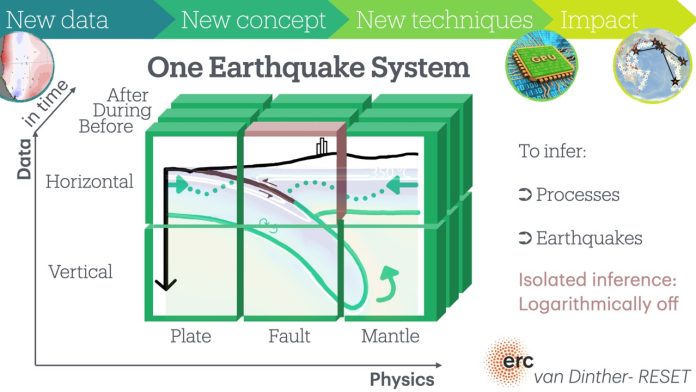Utrecht University’s Department of Earth Sciences is seeking a highly motivated postdoctoral researcher (up to four years) and a PhD candidate (four years) to model and image earthquake systems in subduction zones.
These positions are largely funded by a €2.5m ERC Consolidator grant, “RESET: mega-thRust Earthquake System Theory,” awarded to Dr Ylona van Dinther.
Research focus
RESET aims to improve predictions of earthquake locations, magnitudes, and possibly even timing. By integrating satellite observations and innovative system-based physics, the project introduces an earthquake system model that unifies motion across subduction interfaces, tectonic plates, and the mantle.
This approach bridges spatial, temporal, and methodological inference scales, allowing for a more comprehensive understanding of fault motion and system processes.
Currently, earthquake modelling relies on inverting horizontal surface velocities before, during, or after seismic events. This research will extend inversion methods to include vertical velocities, enhancing our ability to predict earthquake depth and impact.
These advancements could significantly refine earthquake risk assessments for the three billion people living near subduction zones and coastlines.
Methodology
The methodologies for this project build on previous advances in earthquake modelling, which successfully predicted newly observed vertical velocities.
To integrate vast amounts of data into a visco-elasto-plastic Earth-like system, we will leverage the latest high-performance computing techniques for forward and inverse modelling on graphical processing units (GPUs).
Available positions
We are currently seeking one PhD candidate and one postdoctoral researcher. The specific focus of each position will be tailored to the expertise and interests of the selected candidates. Applicants from diverse backgrounds are encouraged to apply.
Position 1: Forward modelling
This position focuses on developing earthquake sequence models within self-consistent lithosphere-mantle-subduction fault systems. You will:
- Develop massively parallel 2D and 3D Earthquake System models using GPU-based pseudo-transient solvers.
- Contribute to the GPU4GEO project using Julia for geodynamic and glaciological applications.
- Implement an invariant rate-and-state friction formulation and develop a subduction zone setup.
- Simulate Chilean, Japanese, and Cascadian margins to investigate fault slip, plate tectonics, and mantle processes governing vertical velocities before, during, and after earthquakes.
Position 2: Inverse modelling
This position focuses on Bayesian inference methods for earthquake system modelling. You will:
- Develop adjoint-based inverse methods to infer fault motions and material parameters.
- Retrieve adjoint gradients for visco-elasto-plastic rheology using GPU4GEO’s automatic differentiation tools.
- Develop and optimise inversion procedures to leverage multi-parameter and multi-observational data.
- Apply inversion techniques to horizontal and vertical surface velocities recorded by satellites before, during, and after earthquakes.
- Study subduction zones in Japan, Chile, the northwestern United States, and the Caribbean Antilles.
Research environment
Both positions will be hosted in the Earth Simulation Laboratory, one of the largest experimental laboratories for studying Earth’s physical behaviour. Under the supervision of Dr Ylona van Dinther, you will collaborate with experts in:
- Seismology
- Experimental Rock Deformation (André Niemeijer)
- Tectonophysics
- Mantle Dynamics
You will also engage with the GPU4GEO community, including Ludovic Räss (Lausanne, ETH Zürich) and Boris Kaus (Mainz), and work closely with the Earth Science Numerical Support team.
Responsibilities and career development
Postdoctoral Researchers may have the opportunity to supervise PhD candidates and BSc/MSc student projects. The postdoctoral position is intended for four years, with an initial evaluation after one year.
PhD Candidates will complete a doctoral degree in four years and participate in a personalised training programme, which includes coursework, workshops, and teaching assistance within Utrecht University’s Bachelor’s and Master’s programmes. About 20% of the PhD trajectory will be dedicated to training and career development.
Requirements
- Postdoctoral researchers: A PhD in Earth Sciences, Computer Science, Physics, Mathematics, Engineering, or a related field by the start date.
- PhD candidates: An MSc in one of the above disciplines by the start date.
Preferred qualifications
- Strong computational skills or interest in code development, high-performance computing, numerical modelling, or adjoint-based inversions.
- Experience in earthquake or geodynamics research.
- Ability to work independently and in a multidisciplinary team.
- Strong scientific writing, presentation, and communication skills.
- Proficiency in spoken and written English.
Employment terms
Postdoctoral researcher
- Duration: One-year contract with the possibility of extension up to four years.
- Work hours: 32–40 hours per week.
- Salary: €3,879–€5,331 per month (full-time, salary scale 10 under CAO NU).
PhD candidate
- Duration: One-year contract with extension to a total of four years based on a successful first-year assessment.
- Work hours: 38 hours per week.
- Salary: €2,901–€3,707 per month (full-time, salary scale P under CAO NU).
Benefits for both positions
- 8% holiday bonus and 8.3% end-of-year bonus.
- Pension scheme, partially paid parental leave, and flexible employment conditions.
- Additional professional development opportunities, cultural and sports facilities, and IT product discounts through Utrecht University.
For more information, contact Dr Ylona van Dinther at y.vandinther@uu.nl.
Recommended reading
Application process
International candidates requiring a visa or work permit should allow at least four months for processing, facilitated by our International Service Desk (ISD).
Finding housing in or near Utrecht is your responsibility, but the ISD may offer guidance. For general information on working and living in the Netherlands, consult the Dutch Mobility Portal.
Utrecht University handles all recruitment for this vacancy; commercial responses are not appreciated. We strive to be an inclusive institution, welcoming individuals from diverse backgrounds and identities.
Click here to find out more and apply now by 20 April 2025, submitting:
- CV
- Motivation letter (indicating PhD or postdoc preference & modelling focus)
- Contact details of at least two referees
- For PhD candidates: academic credentials, including course names and grades
Reference letters are not required upfront; shortlisted candidates’ referees will be contacted. Interviews will be held in May 2025, with a preferred start date in the summer of 2025, or soon after.







